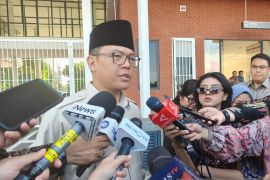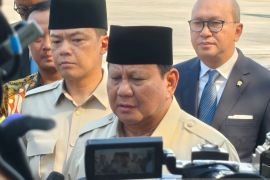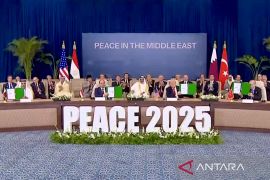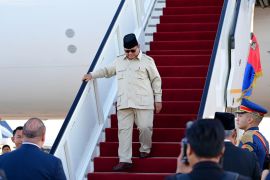But the fact that many Indonesian students and migrant workers were in those countries, has made the Indonesian government busy protecting and evacuating their citizens in those nations torn by political violence.
The Arab Spring began in Tunisia in December 2010 when people protested in the streets demanding the Tunisian president to step down.
As the political tension and violence escalated, the Indonesian embassy in Tunis reacted promptly by evacuating Indonesians living in Tunisia to the embassy and the ambassador`s house.
Indonesian Ambassador to Tunisia Muhammad Ibnu Said stated in January 2011 that around 120 Indonesians were living in several Tunisian cities such as Tunis, Hamamit, Sus and Tantawin in the south
He said all Indonesians in Tunisia were safe, including five Indonesian housemaids working at the Tunisian Presidential Palace who were also successfully evacuated.
Ambassador Ibnu said they were trapped in the palace since their employer, toppled Tunisian President Zine Al Abididn Ben Ali, had left the country on January 14 to seek refuge in Saudi Arabia after public protests against the government reached a peak.
Besides at the Presidential Palace, scores of other Indonesian domestic helpers were also employed by rich local government officials, he said.
Some 32 workers were later sent back to Indonesia in the company of Indonesian officials from the Indonesian foreign ministry.
The situation in Tunisia was back to normal in relatively short time, but the uprising was contagious, as Tunisia`s neighbors, such as Libya was later also hit by similar street protests which turned out to be even more violent and bloody.
Some 875 Indonesians were in Libya before the turmoil, mostly as migrant workers.
With the help of Indonesian embassy staff members in Tripoli, hundreds of Indonesians trapped in the hostile situation in Libya had to struggle to flee from the civil war-wrecked Arab country.
Until March, a total of 839 Indonesians in Libya had already been evacuated to Tunisia.
The evacuees were mostly taken to the Indonesian Embassy in Tunis where they were given temporary accommodations, food, drinks, clothes, medical assistance and counsel.
According to Ambassador Said, 37 of the evacuees were extremely exhausted as they did not have adequate food and drinking water at Tripoli airport.
"They helped each other with the spirit of cooperation among them. Thank God, they survived the 40 hours waiting (at the Tripoli airport)," Said said.
In March 2011, the government temporarily moved its embassy in Tripoli (Libya) to Tunis, Tunisia.
Being concerned about the escalated violence in Libya, the Indonesian government repeatedly urged every party involved in the Libyan conflict, including the Coalition and NATO forces, to use peaceful means in solving the crisis in Libya.
Supporting the National Transition Council in Libya, the Indonesian government outlined three national principles in responding to Libyan affairs from the very beginning.
"The gesture in assisting a peaceful and democratic transitional process by the National Transition Council is in line with the Indonesian position all the time," Indonesian Foreign Affairs Minister Marty Natalegawa said.
The three Indonesian national principles were the protection of civilians in Libya, the political problem should be solved through a political process that provides the opportunity for the Libyan people to determine their own future, and the international community especially the United Nations (UN) should develop a conducive condition for the civilian protection and a peaceful political process.
During the Arab Spring in 2011, the Indonesian government was particularly made very busy by the political tension in Egypt where more than 6,000 Indonesians, mostly students were staying.
In a cabinet meeting on January 31, 2011, President Susilo Bambang Yudhoyono ordered the evacuation of Indonesian citizens and the formation of an evacuation task force.
The task force consisted of personnel from Health Ministry and Transportation Ministry, and was led by former foreign minister Hassan Wirajuda who is also a member of the Presidential Advisory Board and former ambassador to Egypt.
The foreign ministry`s data showed that Indonesian citizens staying in Egypt numbered 6,149, consisting of 4,297 students, 1,002 migrant workers and their family members.
Most of Indonesians in Egypt lived quiet far from strategic places which had been the center of riots. However, they had set up communication networks in 20 post commands.
Indonesia, which was the Chair of ASEAN (Association of Southeast Asia Nations) in 2011, was not the only Southeast ASEAN nations that worried about their citizens in riot-torn Egypt.
Minister Marty in February 2011 said members of ASEAN agreed to cooperate in an effort to protect its citizen in Egypt.
ASEAN member countries as friends of the Egyptian people called on all sides concerned in Egypt to exercise maximum restraint to prevent the bloodshed from continuing.
"The development in Egypt is indeed very concerning. I hope on behalf of a country which is friendly to Egypt, their domestic problems could be overcome well," President Susilo Bambang Yudhoyono said in Zurich, Switzerland, in January 2011 after attending a meeting of the World Economic Forum.
Egypt is the first country to recognize the Indonesian declaration of independence on August 17, 1945.
President Yudhoyono followed up his statement by sending a letter in February to the Egyptian government to share its experience in dealing with political crisis and transition of power with them.
"It contains among other things Indonesia`s wish to share its experience 12 years ago in dealing with a similar crisis now being faced by Egypt," he said.
Indonesia, after experiencing reform in 1998, successfully carried out democratic transition and brought changes from the old order of government to the new one.
Following the stepping-down of Egyptian President Hosni Mubarak on February 11, 2011, and after the situation was back to normal, at least 900 Indonesian students were eager to return to Egypt to continue their study. Up to June 2011, the government managed to send back almost 2,000 students to Egypt.
In April 2011, Minister Marty visited Cairo to hold meetings with his partner, Egyptian Foreign Affairs Minister Nabil Al Arabi, and Egyptian Prime Minister Essam Sharaf.
Besides Egypt, Yemen, which has also been experiencing uprising, is another favorite country for Indonesian students to study about Islamic teachings.
Yemen has been wracked by violent clashes since early February as demonstrators want President Abdullah Saleh to quit.
Indonesian Ambassador to Yemen Nurul Aulia said recently there were 3,259 Indonesian nationals in Yemen, including 1,700 students mostly studying in Mukalla (some 754 km northeast of Sanaa), and Tarim, both in Hadramaut Province.
Indonesians in Yemen can also be found in Sana`a, Hudaidah, Aden, and Sa`ada. Among them are 300 Indonesian female migrant workers (TKW), while around 300 more are believed not to have registered themselves at the Indonesian embassy so their whereabouts was not known.
At least 114 home and local staffers at the Indonesian embassy in Sanaa, Yaman, together with members of their families, were evacuated to the embassy building.
A number of Indonesians, mostly students, were given temporary accommodation at the embassy pending their evacuation process.
"Our embassy in Sana`a is now re-counting around 3,000 Indonesians working there so if the situation gets worse, we are ready to evacuate them," Minister Marty said in Jakarta on February 4.
The Indonesian ambassador to Yemen had put advertisement on At-Thaurah daily on February 20, 2011, urging Indonesian nationals and employers of Indonesian female migrant workers to register themselves or their employees with the Indonesian embassy in Sanaa.
The embassy had built up ample food stock in anticipation of an emergency, and set up emergency command posts in Aden, Mukalla, Hudaidah, Tarim and Sanaa.
Last May, the Indonesian embassy evacuated the third of the four batches of 57 people, mostly students, to Indonesia by regular commercial planes of Yemen Airlines and Emirates Airlines.
The Indonesian embassy on June 1 carried out its fifth batch of evacuation process by sending 17 people comprising students and household maids to Jakarta by Qatar Airways.
Ambassador Nurul Aulia has considered the security situation in the capital of Yemen was very dangerous following fierce fighting between government forces and opposition demonstrators.
Two Indonesian students were killed in hostilities between two rival armed groups in Yemen.
"The two Indonesians were trapped inside their campus that came under artillery fire. The Indonesian Embassy in Sanaa has contacted the deceased`s families who decided to let their bodies be buried in Sanaa instead of in Indonesia," Minister Marty said after meeting with members of the House of Representatives` Commission 1 on foreign affairs, last November 2011.
The dead students were Muhammad Soleh Bin Syamsul Bahri of Batubara, Medan (North Sumatra), and Jamiri Abdullah of Kuala Simpang, Nangroe Aceh Darussalam.
Two Indonesian students were injured in the clash, namely Abdul Hadi of Medan, and Abu Yusuf from Ambon (Maluku Province), and they were treated at a Sanaa hospital, Ambassador Nurul Aulia said.
So far, some 2,300 Indonesians are still staying in Yemen and hundreds were already evacuated back to Indonesia in the worsening situation in that country.
The ambassador said early December 2011 that the Indonesians who are mostly staying in Hadramaut felt safe and became reluctant for an evacuation as many of them wished to continue their study there.
"So far, it seems most of the Indonesian nationals, particularly students, are not yet ready to be evacuated or to leave Yemen," Ambassador Aulia told ANTARA`s correspondent in Cairo on December 11, 2011.
The embassy`s staff in Sanaa could not go to Hadramaut due to the security problem, however, the embassy would find a way for evacuation, the ambassador said.(*)
HAJM/F001
Reporter: Fardah
Editor: Jafar M Sidik
Copyright © ANTARA 2011








